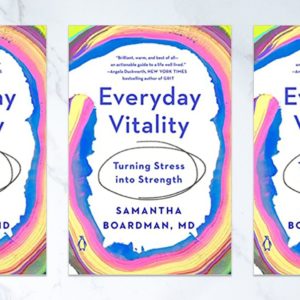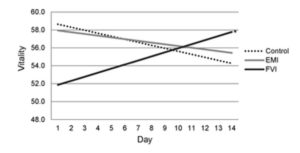Vitality is a word I didn’t hear much in medical school or psychiatry residence. I was well versed in the language of illness, not health. Back then, vitality brought to mind a French yogurt or Richard Simmons dancing to the oldies.


I had no idea how vital vitality was for our physical and mental health. These days vitality is front and center in my daily life and in my clinical practice. It is also the subject of my book that is coming out in paperback in August.


What is vitality?
Vitality is a positive feeling of aliveness and energy that is at the heart of wellbeing. It comes from the Latin word vitalis meaning “of or belonging to life.” Vitality refers to more than merely being active or having enough energy or consuming enough calories (alas, a granola bar isn’t the secret sauce of vitality). Vitality also conjures a feeling of enthusiasm and spirit. It’s in our brain and our body.
When we possess vitality, we feel up to a challenge and ready for anything. When we lack it, we feel drained and indifferent. Languishing and a lack of vitality are soul sisters. Andrew Solomon, psychologist and best-selling author, sums it up perfectly: “The opposite of depression isn’t happiness. It’s vitality.”
The building blocks of vitality
Building vitality relies on boosting the following three basic psychological needs:
-
It is the opposite of feeling controlled or like a pawn.
-
Autonomy protects against feelings of frustration and dissatisfaction.
-
It involves being proactive, planning ahead, and making decisions that reflect your values.
-
It derives from activities as big as completing a meaningful project to actions as simple as making the bed or working on a hobby.
-
Competence protects us against feelings of hopelessness.
-
The more we feel understood and appreciated in our daily lives, the more connected we feel to others.
-
Engaging in meaningful conversations is a reliable way to boost connection.
-
Relatedness protects against loneliness and depression.
Vitality is in the actions we take, the connections we make, and how we participate. Here are 6 reliable vitality boosters:
1. Go outside 🏞
Studies show that spending time in nature makes people feel more alive. “Nature is fuel for the soul,” says Richard Ryan, lead author and a professor of psychology at the University of Rochester. “Often when we feel depleted we reach for a cup of coffee, but research suggests a better way to get energized is to connect with nature.” Be intentional about it. Look up. Look around. Notice something new about your surroundings. The antidote for drudgery is surprise.
2. Sit less and move more 👟
Do something vigorously in the morning and ideally with a friend. Also, think of the many ways you can embed more movement into your day. Take the stairs, get off the subway or the bus a stop early, get a dog, pick up lunch instead of ordering in. Once you start paying attention, you recognize that opportunities to move are everywhere.
3. Get enough sleep 💤
Sleep is vital for vitality. Once you start paying attention to your bedtime rituals, you will find opportunities to optimize your sleep. Put your phone in another room, pull down the shades and eliminate all artificial light (I bring tape with me when I travel to cover any digital offenders), and keep the room cool. According to research, sleep quality predicts people’s daily vitality.
4. Eat your vegetables 🥕
A study found that eating just a few more servings of fruits and vegetables a day can lift your mood and boost our psychological wellbeing in just two weeks. Yes, just two weeks. Participants reported an increase in motivation, vitality and flourishing. It’s the gift that keeps on giving — even after the study was over, people wanted to continue eating their fruits and vegetables because they felt so good.

Source: Let them eat fruit! The effect of fruit and vegetable consumption on psychological well-being in young adults: A randomized controlled trial
5. Cultivate connection 👯♀️
Vitality and social connection go hand in hand. Make the most of your interactions with others. Give them your full attention. Engage in meaningful conversations. Show up for your friends. Ask the barista how his day is and actively listen to his response. Express gratitude to a loved one. Pick up the phone instead of sending a text. Give a compliment to a colleague. Prioritize in person interactions. Volunteer this weekend for an organization you care about. Giving of our time and of ourselves is a reliable vitality booster for all involved.
“A vital person is someone whose aliveness and spirit are expressed not only in personal productivity and activity-such individuals often infectiously energize those with whom they come into contact,” observed Martin Seligman and Mihaly Csikszentmihaly in Character Strengths and Virtues.
6. Learn something 🧠
Make time for personal projects that expand your mind or expose you to new ideas or experiences. Whether you do something creative, athletic, academic, or something more individualized, what really matters is that it is something you find meaningful. Effortful intentional activities that stretch the body or the mind may not be experienced as pleasurable in the moment, but when we recall them, we’re more likely to think, “Wow, that was awesome!” or “That was time well spent.”
One study found that mastering a new skill or challenging yourself intellectually is more effective at reducing anxiety and building resilience than demand-shielding activities. Using our minds feeds our psychological need for growth, discovery, and expansion. In addition, gaining new skills or knowledge directs our focus outside of ourselves. As astronomy professor Abraham Loeb once observed, “Learning means giving a higher priority to the world around you than to yourself.”
Vampires of Vitality
Every single day there are countless scenarios in which we misjudge what will replenish or fortify us. After spending nine hours at your desk and another hour getting home, it’s understandable that all you want to do is collapse onto the sofa. A friend calls and invites you out to meet her new boyfriend. You decline because you just don’t have the energy. Spending the evening in front of mind-numbing television is so much easier and requires so little.
Devitalizing activities are “cotton candy for the soul.” The first bite tastes good, but by the time you have polished off the pink tornado, your tongue hurts and your hands are sticky. You are filled with sugar and regret. On top of feeling gross, you’re still hungry.
Bottom Line: beware the vampires of vitality and make vitalizing choices that nourish you.
I wish you all the best,
Dr. Samantha Boardman






